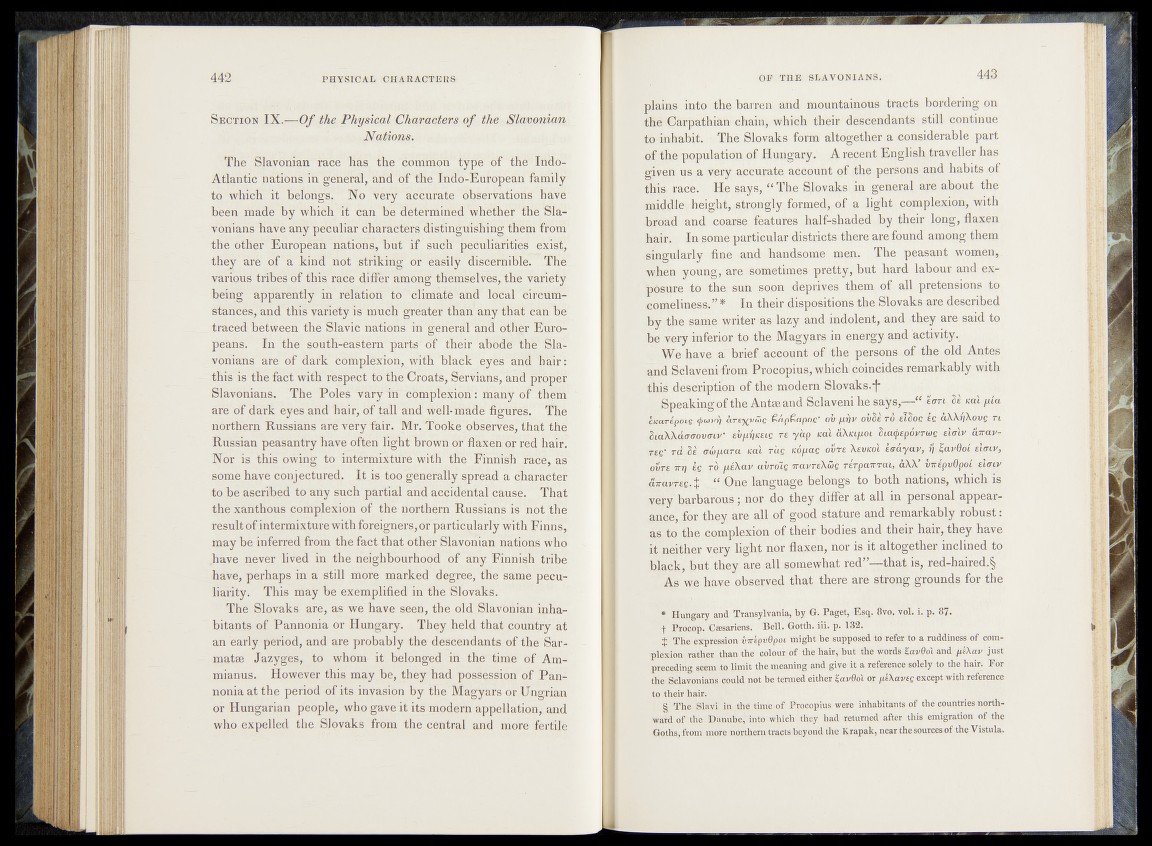
S e c t io n IX.-—0 / thePhysical Characters o f the
Nations.
The /Slavonian race has the common "type ' oi tner Indo-
Atlantic nations in general/and of the Indo-Furdpeah family
to which it Belongs. , No very “ accurate " cxbservations ’have
been made by which^ip can be deterlhihed whether the Sla-
vohians have any peculiar characters diltin'guisntng them Troth
the other European nations, bu t if suc'n peculiantles exist,
they are of a kind not striking or easily discerning. The
various tribes of this race differ a'mong TO^seHes', the variety
being /apparently in relation’To climat6J'and'
stances, and this variety % much greaiepthan any that ban be
traced between the Slavic nafiohs^n^ffinefar'and otligp Ej|rb-
In the south-eastern "parts'df raeir aBooe the Slavonians
are of dark complexion^ witn/maclt eyes^and buff:
this is the fact with respect to the t/roats, Serviansy and'j^rtirer
Slavonians. The Poles varyTn complexion: ihahy or/ them
are of dark eyes.and "hair, of fall and' ^ell-mMe TKe
northern Russians she Very fair. ’Mr. Tooke wi^ervesi thatjJfiSe
Russian peasantry have often light brown or naxenor red ham
Nor is this ’owing to intermixture witn* the Finnish r ^ ^ , as
some have conjectured. It is too generally spread a cjiaractcf
to b e ascribed to any such partial and ^ That
the xanthous complexion of the northern Russians is not the
result of intermixture with foreigners, orparticularly with Finns,
may be inferred from the fact that other Slavonian nations wlio-
have never lived in the neighbourhood of any Finnish tribe
have, perhaps in a still more marked degree, the same peculiarity.
This may be exemplified in the Slovaks.
The Slovaks are, as we have seen, the old Slavonian inhabitants
of Pannonia or Hungary. They held that country at
an early "period, and are probably the descendants of the Sarin
atm Jazyges, to whom it belonged in the time of Am-
mianus. However this may be, they had possession of Pannonia
at the period of its invasion by the Magyars or ITngrian
or Hungarian people, who gave it its modern appellation, and
who expelled the Slovaks from the central and more fertile
rnlains into the barren and mountainous tracts, bordering on
the 'Carpathian chains which their descendants still continue
to fohabit. The Slovaks form altogether a considerable part
-of therpopula.tion of Hungary:.' A recent English traveller has
given us a :ypry accurate account of -the persons and habits of
'th E a c e . He says, / T^S jo y ak s.lp f general are about the
middles h e i g h t , g l y formed^ of a light complexion, with
broad and .coarse fixtures half-shaded by their long, flaxen
hair, particular districts t^jere„are found among, them
^singularity -fine and handspme men. The peasant women,,
when young;,, are^&gjEoe times pretty, but hard labour and exposure
to the sun ;s,9pn,)4ep¥v-es thcfU', °f all pretensions to
.feomelin^ss^ * In their dispositions the^lov^iks are descri bed
by.^ie same writer as lazy and indolent, and they are said to
-be^ery .inferior to the Magyars in energy, and activity.
We have a brief.account of the persons „of the old Antes
end Sdafeveni-from Procopius, which{coincides remarkably with
this description ©f^the modern Slovaks.f
|||&peaking of the Antseand Sclaveni he says,— “ eari^e Kal ^
■ S fc h .~ { o O lQ ! ( f> h li> r ) ^ ^ ( V , S ) Q t€4pSapQ£' ot./UJV O V § kg lT O j£ t (> O Q r£Q / a X X f j X o V Q T l
<}^uXX4aaoviriv" pvpyKsiQ^^e y^p m \ aXupoi tiicupepoyTioe .elalv &iravr
T&diigwiJ.aTa k c l l rag KO/nac aireXevKol ipa<yav,1\ lavBoi.Eioiv,
..Cute Trq Ic i:(Lu£)iav abroig fravTeXufgTET^aTreai, aXX vnepvdpoi eunv
#TrayT£Q.X One.language belongs to both nations, which is
dSunbarbarous; nor do they,differ at all in personal appearance,
for they, ai;e aff of good stature and remarkably robust:
as. to the complexion of .their bodi.es, and their hair, they have
it neither very light nor flaxen, nor is it altogether inclined to
black, but they, are all somewhat r<$f-*that is? red-haired.^
As we have observed that there are strong grounds for the
« Hungary and Transylvania, by G. Paget, E sj. 8vo. VjJL i. p. 87.
■f Procop. Csesariens. Bell. Gotth. iii'.p. 132.
X The expression.iiTTspuOpoi might he supposed to refer to a ruddiness of complexion
rather than the colour of the hair^ but the words £av9o\ and pkXav just
preceding seem tp Ujnit the meaning and give it a reference solely to.the hair. For
the Sclavonians Could npt he termed either %av9oi or psXavts except with reference
to their hair.
* § The Blavi in the time-of Procopius were inhabitants of the countries northward
of the Danube,^ into whieh they had returned after this emigration of the
Goths, from more northern tracts beyond the Krapak, near the sources of the Vistula.